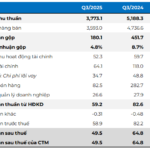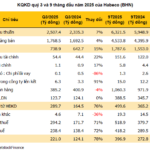Credit Demand from Cooperatives Declines
At the National Workshop on “Solutions to Remove Barriers in Credit Access for the Cooperative Economic Sector,” organized by the Vietnam Cooperative Alliance and the State Bank of Vietnam on the morning of April 23rd, Ms. Pham Thi Thanh Tung, Deputy Head of the Credit Department for Economic Sectors (State Bank of Vietnam), stated: By the end of February 2024, outstanding loans to cooperatives and cooperative unions reached VND 6,043 billion, extended to nearly 1,200 cooperatives and cooperative unions, marking a 1.68% decrease compared to the end of 2024.
The low level of credit extended to cooperatives is attributed to factors such as lack of collateral, financial transparency, inefficient operations, and weak governance. Additionally, the pandemic and economic challenges, coupled with price fluctuations in commodities and raw materials, have significantly impacted cooperatives’ investments and financial performance.

Deputy Governor of the State Bank of Vietnam, Mr. Dao Minh Tu, delivers his speech at the workshop on April 23rd.
“Most cooperatives and cooperative groups are small-scale, under-capitalized, and operate within a narrow scope; internal cohesion within cooperatives remains weak. Issues related to market orientation, application of science and technology, and digital transformation in cooperative operations are still limited. Notably, the problem of cooperative debts and the unresolved issue of capital misappropriation persist,” said the Deputy Head of the Credit Department for Economic Sectors.
Furthermore, according to feedback from credit institutions, the management mechanism, legal framework, and legal status of cooperative economic organizations also pose challenges for credit institutions in determining the responsibility and debt obligations of this type of collective economy. Some cooperatives misuse loan funds, divert funds from their intended purposes, incur long-term overdue debts, and display a sense of complacency and dependency on government support.
Acknowledging the lack of feasibility in business plans of certain cooperatives and their failure to meet lending conditions, Mr. Ta Viet Hung, Chairman of the Board of Directors and Director of Ba Vi Green Farm Investment and Cow Development Cooperative (Hanoi), proposed: The Government should establish tailored mechanisms to suit different regions and industries throughout the country; eliminate unnecessary conditions and procedures for cooperatives seeking preferential loans; and develop methods for mortgaging assets formed from loan capital.
“Our cooperative has repeatedly engaged with credit institutions seeking loans but has been unable to access them due to lending conditions such as the requirement for 100% of members to sign acknowledgment letters and the need for collateral to secure the loan,” said Mr. Hoang Cong Truc, Director of Thach Son Agricultural and Electricity Service Cooperative (Phu Tho Province), expressing his concerns.
Need to Enhance Governance Capacity, Business Transparency
In light of these challenges, Ms. Pham Thi Thanh Tung stated that the Bank will continue to propose the improvement of credit policies and mechanisms to facilitate lending in general and to cooperatives in particular, such as: Reviewing, evaluating, and summarizing Decree 55/2015/ND-CP on credit policies for agricultural and rural development; continuing to amend Circular 02/2023/TT-NHNN on restructuring loan repayment terms and maintaining debt classification for customers; and effectively implementing credit programs that support interest rates and National Target Programs to assist cooperatives in stabilizing, recovering, and developing their economies.
To enable the banking sector to fulfill its mission of supporting the sustainable development of the collective economy and cooperatives, the NHNN representative requested: The ministries, sectors, and localities to promptly submit to the competent authorities for the issuance of implementing guidelines for the Cooperative Law (effective from July 1st) to synchronously implement support mechanisms for KTTT development and cooperatives; and effectively carry out the state management role for KTTT by strengthening the inspection and supervision of KTTT activities to ensure compliance with legal regulations.
“On the part of cooperatives, it is necessary to meet all the conditions and requirements of a cooperative organization (regarding capital, assets, human resources, business plans, etc.); ensure operations in accordance with the true nature of cooperatives; develop and implement effective business plans, comply with the regulations of cooperative production models, maintain financial transparency, ensure timely debt repayment, and serve as a basis for credit institutions to provide loans,” Ms. Pham Thi Thanh Tung proposed.
“To address the issue of fragmented and small-scale production and business operations, cooperatives should actively participate in value chains to maximize the capabilities and potential of each cooperative. In particular, credit funds and the banking system must also participate in the value chain; this is a crucial link in providing timely capital to cooperatives seeking loans to upgrade technology or expand production,” suggested Mr. Ta Viet Hung.
Several cooperatives agreed that to enhance their ability to access capital, cooperatives need to focus on maintaining proper accounting records and ensure transparency in accounting practices; and provide management training to improve the skills of cooperative managers. “We propose to the relevant agencies to consider re-evaluating land prices for loans to bring them closer to market value; extending loan terms for projects to 10 years; learning from successful models to improve management practices and facilitating inter-cooperative trade to support product distribution,” said Mr. Hoang Cong Truc.





































